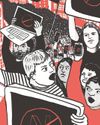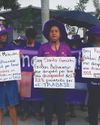During the York University strike of 2018, workers on the picket line found themselves being watched

Imagine getting an email from your boss titled “Your monthly performance.” That uneasy feeling gripping you is related to the possibility that you have done something that will put your job at risk. This anxiety is not the result of a known or specific threat – rather, it comes from the anticipation of possible dangers that have not yet manifested. Whereas fear is characterized by emotional responses to known threats, anxiety is a chronic insecurity that arises out of what is unknown.
What links precarious work to anxious workers is this chronic insecurity. Modern work increasingly lacks predictability, security, and material or psychological support. Precarity is a form of insecurity that treats workers as disposable. Such feelings of disposability are then channelled into management rhetoric – brand management, anger management, parental management, time management – all of which, according to the Institute for Precarious Consciousness, offer anxious workers the illusion of control in return for the ever greater internalization of insecurity. Typically, though, anxiety and insecurity – in the workplace and beyond – are treated as individual problems rather than collective ones. Writing in the New Inquiry, Isabell Lorey points out that under the yoke of neoliberal capitalism, self-management is becoming part of the structural fabric of our workplaces, and has developed into an indispensable tool for controlling workers.
هذه القصة مأخوذة من طبعة November/December 2018 من Briarpatch.
ابدأ النسخة التجريبية المجانية من Magzter GOLD لمدة 7 أيام للوصول إلى آلاف القصص المتميزة المنسقة وأكثر من 9,000 مجلة وصحيفة.
بالفعل مشترك ? تسجيل الدخول
هذه القصة مأخوذة من طبعة November/December 2018 من Briarpatch.
ابدأ النسخة التجريبية المجانية من Magzter GOLD لمدة 7 أيام للوصول إلى آلاف القصص المتميزة المنسقة وأكثر من 9,000 مجلة وصحيفة.
بالفعل مشترك? تسجيل الدخول

PLATFORMS FOR PEOPLE, NOT PROFIT
Digital platforms boast that they’ve “democratized” cultural production. But what would truly democratic platforms look like in Canada?

ORGANIZING THROUGH LOSS IN THE HEART OF OIL COUNTRY
The story of climate justice organizing in Alberta, at the heart of the tarsands, is the story of a group of young activists learning what it means to lose, and keep on fighting

GROWING THE LABOUR MOVEMENT
How unions are using community gardens to engage members, nourish communities, and help strikers weather the picket line

A NEW ERA FOR OLD CROW
In the Yukon’s northernmost community, the Vuntut Gwitchin First Nation is reckoning with how to preserve their land and culture, amid a warming climate and an influx of tourists

“At Least Hookers Get Wages”
The risky business of sex work in the gig economy

The Literal – And Literary – Futures We Build
Briarpatch editor Saima Desai talks to two judges of our Writing in the Margins contest about Idle No More and MMIWG, ethical kinship, writing queer sex, and their forthcoming work.

The Cost Of A T-Shirt
In Honduras, women maquila workers are fighting back against the multinational garment companies that they say are endangering their health and safety.

Milking Prison Labour
Canada’s prison farms are being reopened. But when prisoners will be paid pennies a day, and the fruits of their labour will likely be exported for profit, there’s little to celebrate.

Bringing Back The Beat
In mainstream media, labour journalism has been replaced by financial reporting and business sections. But journalism students are raising the labour beat from the grave.

There's No Journalism On A Dead Planet
Corporate media owners are killing local newspapers – which is making it impossible for everyday people to understand the on-the-ground impacts of the climate crisis